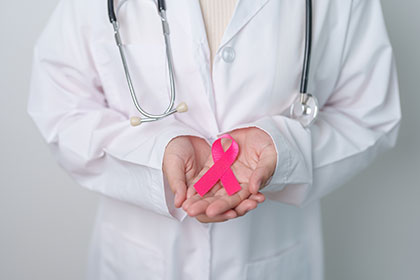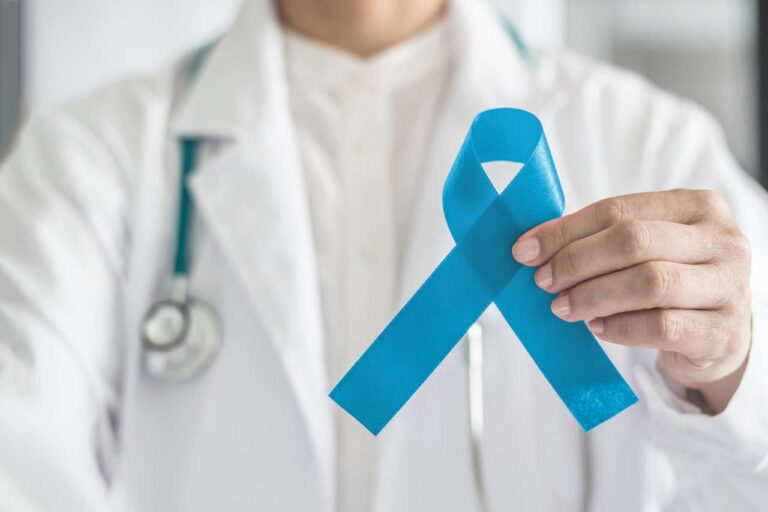
When diagnosed with cancer — especially if it has spread or returned after treatment — many patients urgently search for effective treatment options.
Fortunately, the continuous advancement in cancer treatment has brought new hope in the form of targeted medicine called Enhertu.
Get Financial Assistance for Enhertu
Enhertu (fam-trastuzumab deruxtecan-nxki) is the first and most effective cancer-targeted therapy for treating a variety of hard-to-treat cancers, particularly those that are HER2-positive, HER2-low, or HER2-ultralow.
This article breaks down everything you need to know about Enhertu, including the types of cancers it treats, how it works, how to use it, typical side effects, and more.
What Is Enhertu?
Enhertu (also known by its generic name, fam-trastuzumab deruxtecan-nxki) is an antibody-drug conjugate (ADC), which means it contains two active components that are linked together:
- A monoclonal antibody (trastuzumab) that targets a specific marker protein called human epidermal growth factor receptor 2 (HER2) present on the surface of some cancer cells.
- A chemotherapy medication (deruxtecan or DXd) that is attached to the antibody and delivered directly to the cancer cells.
Enhertu belongs to the HER2 inhibitors drug class and was first approved by the FDA in December 2019.
What Type of Cancers Does Enhertu Treat?
The U.S. Food and Drug Administration (FDA) first approved Enhertu for treating adult patients with unresectable or metastatic HER2-positive breast cancer who have undergone two or more prior anti-HER2-based regimens. Since then, Enhertu has been approved globally for the treatment of several other indications, including:
- HER2-positive breast cancer
- HER2-low breast cancer
- Hormone receptor (HR)-positive, HER2-low or HER2-ultralow breast cancer
- HER2-positive advanced stomach or gastroesophageal junction cancer
- HER2-mutant non-small cell lung cancer (NSCLC)
- HER2-positive solid tumors with HER2 mutations
In short, Enhertu may not only help patients with traditional HER2-positive tumors but also those with HER2-low or HER2-mutated cancers that were previously difficult to treat.
How Effective is Enhertu for Patients?
Enhertu showed promising results during clinical trials. For instance, compared to chemotherapy, Enhertu reduced the risk of cancer progression or deaths by 36% in patients with HR-positive, HER2-low or HER2-ultralow metastatic breast cancer. On average, patients who took Enhertu have experienced longer progression-free survival (about 13 months), compared to those who received regular chemotherapy.
Similarly, in studies of stomach cancer and lung cancer, Enhertu has also shown significant benefits, especially when previous treatments have failed.
For instance, in patients with previously treated HER2-positive advanced gastric cancer, Enhertu reduced the risk of death by 41% compared to chemotherapy.
How It Works
Some breast cancer cells overexpress HER2 (short for Human Epidermal Growth Factor Receptor 2), which is a protein that behaves like an antenna on the surface of the cancer cells. When HER2 protein receives signals, it stimulates the cancer cell to grow and multiply rapidly. Patients with overexpression of the HER2 gene are considered HER2-positive.
Some tumors have lower levels of HER2 and are classified as HER2-negative, HER2-low, or HER2-ultralow.
- Enhertu Working Mechanism
Enhertu contains two active parts that are linked together: a monoclonal antibody called trastuzumab and a chemotherapy drug called deruxtecan or DXd.
Trastuzumab is designed to attach to the HER2 proteins on the cancer cells and stop these proteins from stimulating the growth of cancer cells. Trastuzumab also activates the immune cells that kill the cancer cells.
Once the antibody attaches to the breast cancer cells, it moves inside the cells and delivers the potent chemotherapy medication (deruxtecan) that kills the cancer cells by blocking an enzyme (protein) called topoisomerase I, which is involved in making new cancer cells.
Moreover, Enhertu also exhibits a “bystander effect,” which means it kills the neighboring cancer cells even if they don’t express the HER2 proteins. This makes the Enhertu an effective and more targeted treatment for patients with low or ultra-low HER2 breast cancers.
Speak to a Specialist
About Copay AssistanceHow Is Enhertu Administered, and What Is Its Recommended Dosage?

Enhertu is available in the form of 100 mg lyophilized powder in a single-dose vial that is reconstituted with 5
ml of sterile water prior to administration.
Enhertu is administered intravenously (into a vein) once every 3 weeks in a 21-day treatment cycle. Your first infusion will take over 90 minutes. If you don’t experience any adverse reactions to your first treatment, subsequent infusions will typically take about 30 minutes.
- Recommended Dosage
The recommended dosage of Enhertu for adults with unresectable or metastatic HER2-positive, HR-positive, HER2-low, and HER2-ultralow cancer is 5.4 mg/kg. Similarly, patients with HER2-positive solid tumors with HER2 mutations also receive the same dose (5.4mg/kg).
On the other hand, patients with unresectable or metastatic HER2-Mutant NSCLC receive a dose of 6.4 mg/kg once every 3 weeks as long as the treatment remains effective.
Under What Conditions Is Enhertu Taken?
Enhertu may be considered under the following conditions:
- You have HER2-positive or HER2-low breast cancer.
- Your cancer has spread to other body parts (metastatic).
- Your cancer is not removable by surgery.
- Your cancer has returned during or within six months of prior treatments, like HER2-targeted treatments or endocrine therapy.
- You have advanced stomach, lung, or other HER2-positive solid tumors.
- Previous treatments are no longer working, and your cancer still tests positive for HER2 expression or mutation.
- You have no other satisfactory treatment options.
What are the Possible Side Effects?
The most common side effects reported during the clinical trials are as follows:
- Nausea
- Vomiting
- Diarrhea
- Constipation
- Low appetite
- Tiredness
- Low white blood cell counts (leukopenia)
- Low red blood cell counts (anemia)
- Low platelet counts (thrombocytopenia)
- High liver function tests
- Hair loss (alopecia)
- Low levels of blood potassium
- Muscle or bone pain
Though rare, Enhertu may also cause some serious side effects like:
- Interstitial lung disease (a disorder causing scarring in the lungs)
- Pneumonitis (inflammation of the lungs)
- Left Ventricular Dysfunction
- Neutropenia (Low neutrophil counts)
If you experience any of the above symptoms, consult your healthcare provider immediately.
Get Copay Assistance Now
What Should I Tell My Healthcare Provider Before Taking Enhertu?
Before you take Enhrertu, tell your healthcare provider if you:
- Have lung or breathing problems
- Have signs or symptoms of an infection
- Have or have had any heart problems
- Are pregnant because Enhertu can cause embryo-fetal toxicity or severe birth defects
- Are breastfeeding or plan to breastfeed — It is not known whether Enhertu passes into breast milk. You should avoid breastfeeding during treatment and for at least 7 months after your last dose.
- Taking any prescription or non-prescription medications, such as over-the-counter medications, supplements, or herbal products.
Note: ENHERTU may cause fertility problems in males, which may affect the ability to father children.
Is Enhertu a Chemotherapy or Immunotherapy?
Enhertu is not like traditional chemotherapy (which kills both healthy and cancerous cells) or immunotherapy (which helps your immune system fight cancer). Instead, it is a combination of chemotherapy and targeted therapy.
The antibody part of Enhertu finds and attaches to cancer cells that have the HER2 protein, while the chemotherapy drug (DXd) is then delivered into the cell to kill it from the inside.
How Much Does It Cost?
Enhertu is typically an expensive medication, and its cost can vary depending on the dosage and your insurance coverage.
In the U.S., a single 100 mg vial can cost between $2,440 and $3,022.76. The total cost of Enhertu treatment may range from approximately $9,574 to $165,949 per year, depending on the dosage and duration of treatment. To reduce your out-of-pocket expenses, you can enroll in the ENHERTU4U program, which offers copay assistance and patient support. Contact us if you are interested in getting copay assistance for Enhertu.
REFERENCES:
- US Food and Drug Administration (FDA). Enhertu (fam-trastuzumab deruxtecan-nxki) Prescribing Information: https://www.accessdata.fda.gov/drugsatfda_docs/label/2019/761139s000lbl.pdf
- European Medical Agency (EMA). Enhertu (fam-trastuzumab deruxtecan-nxki) Prescribing Information: https://www.ema.europa.eu/en/medicines/human/EPAR/enhertu
- Trastuzumab deruxtecan (Enhertu). https://www.cancerresearchuk.org/about-cancer/treatment/drugs/trastuzumab-deruxtecan
- Administrator. (2023, September 21). Trastuzumab deruxtecan (Enhertu). Breast Cancer Now. https://breastcancernow.org/about-breast-cancer/treatment/targeted-biological-therapy/trastuzumab-deruxtecan-enhertu
- Trastuzumab Deruxtecan for Metastatic HER2-Low Breast Cancer. (2022). Cancer.gov. https://www.cancer.gov/news-events/cancer-currents-blog/2022/enhertu-her2-low-breast-cancer
- Bardia, A., Hu, X., Dent, R., Yonemori, K., Barrios, C. H., O’Shaughnessy, J. A., Wildiers, H., Pierga, J., Zhang, Q., Saura, C., Biganzoli, L., Sohn, J., Im, S., Lévy, C., Jacot, W., Begbie, N., Ke, J., Patel, G., & Curigliano, G. (2024). Trastuzumab Deruxtecan after Endocrine Therapy in Metastatic Breast Cancer. New England Journal of Medicine. https://doi.org/10.1056/nejmoa2407086
- Siddiqui, T., Rani, P., Ashraf, T., & Ellahi, A. (2022). Enhertu (Fam-trastuzumab-deruxtecan-nxki) – Revolutionizing treatment paradigm for HER2-Low breast cancer. Annals of Medicine and Surgery, 82, 104665. https://doi.org/10.1016/j.amsu.2022.104665
- Martín, M., Pandiella, A., Vargas-Castrillón, E., Díaz-Rodríguez, E., Iglesias-Hernangómez, T., Martínez Cano, C., Fernández-Cuesta, I., Winkow, E., & Perelló, M. F. (2024). Trastuzumab deruxtecan in breast cancer. Critical Reviews in Oncology/Hematology, 198, 104355. https://doi.org/10.1016/j.critrevonc.2024.104355
- Varghese, R., Soman, N., Karsiya, J., Bafna, N., & Nag, S. (2022). Fam-trastuzumab deruxtecan-nxki (Enhertu®): A narrative drug review. Cancer Research Statistics and Treatment, 5(4), 701–709. https://doi.org/10.4103/crst.crst_302_22
- Curigliano, G., Hu, X., Dent, R. A., Yonemori, K., Barrios, C. H., O’Shaughnessy, J., Wildiers, H., Zhang, Q., Im, S., Saura, C., Biganzoli, L., Sohn, J., Levy, C., Jacot, W., Begbie, N., Ke, J., Patel, G. S., & Bardia, A. (2024). Trastuzumab deruxtecan (T-DXd) vs physician’s choice of chemotherapy (TPC) in patients (pts) with hormone receptor-positive (HR+), human epidermal growth factor receptor 2 (HER2)-low or HER2-ultralow metastatic breast cancer (mBC) with prior endocrine therapy (ET): Primary results from DESTINY-Breast06 (DB-06). Journal of Clinical Oncology. https://doi.org/10.1200/jco.2024.42.17_suppl.lba1000












